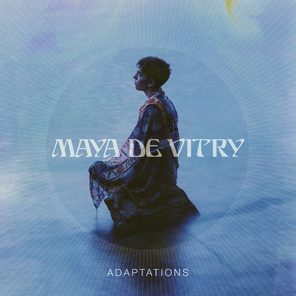Maya de Vitry Crosses into New Territory

The title of Maya De Vitry’s first solo album, Adaptations, couldn’t be more perfect, for she’s adapting, on the one hand, to a solo career, but she’s also exploring, on the other hand, the many changes that individuals experience as they go through life. We adapt to a new partner, we try to make our way in a new city or new home, we look for the key that unlocks the secret to fitting into the world around us. Here, de Vitry unravels the emotional threads that accompany our adaptations.
De Vitry herself adapted to a new world in the summer of 2016 when she retreated to her grandparents’ cabin in Pennsylvania. Songs poured out of her as she contemplated love and loss, borders and bodies, wilderness and solitude, and belonging and exclusion. She gathers guitarist Anthony da Costa, bassist Sam Grisman, and drummer Jason Burger in her backing band, and producer Dan Knobler joins them on guitars, organ, and percussion. Adaptations moves between the contemplative and the celebratory, the incantatory and the ebullient, always pushing us to examine the ways we fit, or don’t fit, into our worlds.
The album opens with the Donovan-like “Wilderness,” a haunting chamber piece in which de Vitry’s ethereal vocals float evocatively through a sonic soundscape of strings and guitars. In only two verses, she creates an emotional landscape through which the heart travels. She leaves the familiar behind — “It’s time to leave the trail behind” — and admits that she’s “never found a way / to love without getting lost.” “Go Tell a Bird” echoes the Beatles’ “Norwegian Wood” musically, but it moves that tune’s chords and musical lines into a more surrealistic setting that mimics the urgency of a bird flying frantically to find a way out of being trapped in an environment. De Vitry’s lyrics forcefully confront the alienation of others that often occurs in the name of love and security: “Go tell love / You wanna see her papers / And then go tell a bird / About the land of the free.” “How Do I Get to the Morning” sounds as if it flows right out of the late Jesse Winchester’s repertoire, with a “Rhumba Man” rhythm propelling it, and with a funky slide guitar on the bridge that resembles Bonnie Raitt’s playing.
Adaptations showcases de Vitry’s incisive and pensive way with a lyric, her canny ability to capture the emotional and political territory in which we find ourselves in America these days, and her genius in creating musical frameworks that mimic the ambivalent ways we attempt to make it through our lives.




